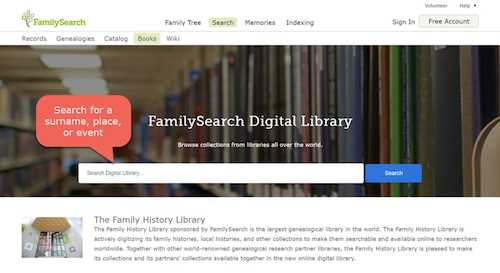
Here is a quote from https://www.familysearch.org/library/books/:
"Over 500,000 free genealogy books, family histories, maps, yearbooks, and more are available on the FamilySearch Digital Library.
"The Digital Library can connect you to the stories of your ancestors and lead you to new discoveries.
"Search this collection to find books about your family members. Discover the history of the places they lived. Read more about the events that may have changed the course of your great-great grandmother’s life. Learn more about annual traditions of your grandfather’s local church. New content is regularly added, so if you don’t find what you’re looking for, it may be there next week. The possibilities of what you might find are endless.
"The Digital Library can connect you to the stories of your ancestors and lead you to new discoveries."
Indeed, I have used the FamilySearch Digital Library a number of times and have been pleased with the results. Of course, I probably could have achieved the same results had a I purchased airline tickets to Salt Lake City, spent money on taxis or Uber, spent money in hotels and restaurants for a few days, and paid whatever other miscellaneous expenses are incurred on a multi-day trip. Besides that, such a trip also involves an "investment" of several days of my time.
The FamilySearch Digital Library is available free of charge. That's great, but the real "bottom line" financial benefit is even more impressive. Remotely accessing the Digital Library actually SAVED me hundreds, perhaps a thousand, dollars or so when compared to the traditional method of using my hard-earned money to pay for a trip to Salt Lake City to use a library there.
To paraphrase Benjamin Franklin's Poor Richard's Almanac, a penny saved is worth MORE than a penny earned because you don't have to pay income taxes on money that is saved. If you earn money, in most cases your earnings are taxable, leaving you with less money in your pocket or purse. (Unlike traditional sources of income, money saved does not require the payment of income taxes! A penny saved is therefore worth more than a penny earned (after taxes).
Note: "A penny saved is a penny earned" is a quote often attributed to Benjamin Franklin, but it appears that he never wrote those exact words. Instead, he originally wrote, "A penny saved is two pence clear." Later, he wrote a version closer to the saying we know: "A penny saved is a penny got." He never used the word "earned." However, a number of other authors have written the familiar version, "A penny saved is a penny earned."
The digital library at https://www.familysearch.org/library/books/ is a powerful resource for finding family history books and learning about families and places all over the world. Not only are the books and microfilms stored in Salt lake City, but digitization is also taking place at other major genealogy libraries, including:
Allen County Public Library
Arizona State Library, Archives and Public Records
Birmingham, Alabama Public Library
BYU Family History Library
Columbus Metropolitan Library
Dallas Public Library
Family History Library
George A. Smathers Libraries at University of Florida
Historical Society of Pennsylvania
Houston Public Library
Midwest Genealogy Center
Onondaga County Public Library (with a Local History/Genealogy research department specializing in the history of Syracuse, Onondaga County, New York State, the New England States, Pennsylvania and New Jersey)
Ontario Ancestors (The largest family history society in Canada)
St. Louis County Library
The Miriam Weiner Routes to Roots Collection
The Southern California Genealogical Society and Library
Provo Daughters of Utah Pioneers Museum
Searching the FamilySearch Digital Library also includes searches of all the above libraries, resulting in saving even more money: I don't have to travel to all those libraries!
There is one major downside, however: the digitization of the genealogical works at all of these libraries is still a work-in-progress effort. That is, none of the libraries have yet had all of their collections digitized. Digitizing crews are presently active in many of these libraries, and more digital documents are being added weekly to the FamilySearch Digital Library's web site. If you don't find what you seek today, come back again every month or two and search again. The information you seek may have been added since your last search.
You can find the FamilySearch Digital Library at https://www.familysearch.org/library/books/
To access the library, follow the instructions at: https://www.familysearch.org/blog/en/family-history-books/
Have fun at the (digital) library!